Europe Diary 2
Duderstadt, Germany
Armed with the 9 Euro concessional tickets, we decided to examine the bus routes that starts from Goettingen. The townof Duderstadt located about 30km east of Gottingen fitted the bill. We started after an early lunch and reached the town after about 40 minutes bus ride. Like all town and cities we have visited so far, Duderstadt too has a sprawling city centre surrounded by cafes, sculpture, the town hall and two churches, one for the Catholics, the other for the protestants.
The town, unaffected by the world war-II bombings, with a huge no. of old ‘half-timbered’ houses lining the roads laid 700 years ago, looks nostalgic and beautiful. Its strategic location in the ancient trade routes gave it a unique advantage. Through the majority of its existence, life in this 1300 year old settlement moved around the Rathaus (Town Hall) which was the centre of trade, treasury, court, torture chamber, prison and storage for salt when that commodity was considered really precious (till the 15th century A.D., before refrigerators came into being, adding salt was the principal means of food preservation). The treasury and accounts were handled by four officials who were retired every two year in rotation. The council’s money used to be stored in a big box which needed four keys to be operated simultaneously.
Another interesting thing is a wooden pole (pranger, pillory) with a handcuff like large ring that can be locked. The offenders use to neck-cuffed in that place. Small offences like one’s cattle grazing into someone else’s field called for a two hour stand. Bigger offenders used to be taken away to the torture chamber at the basement of Rathaus and/or to the ground for execution.
Treasury box with four key holes
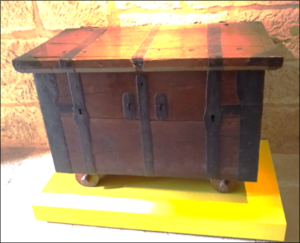
Punishment at the Pillory
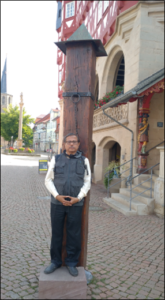
Germans love old buildings and sculptures (both new and old). In Duderstadt city centre we found this interesting modern sculpture of a couple whose features seems to have been flattened by a channel running in-between (as if to prevent their union)
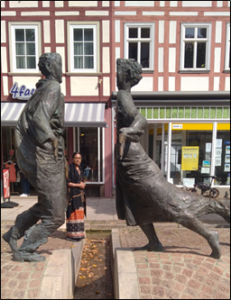
Our route to Duderstadt
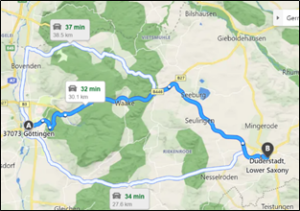
There is also a twisted tower. Folklore tells, watching the devil enticing the menfolk to drink more the women chased him. While fleeing from the women the devil twisted the tower in frustration
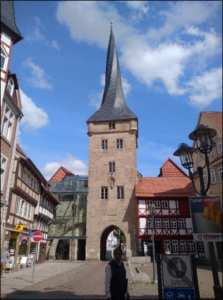
The nine centuries old Rathaus
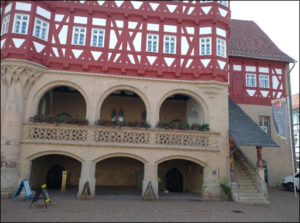
An old street in Duderstadt
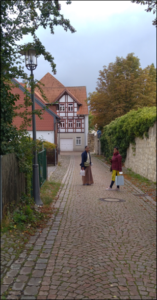
Church at the sprawling city
Centre
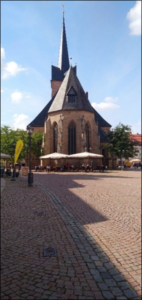
Having visited the beautiful city centre and the Rathaus (Town Hall), we were looking for coffee. One restaurant spotted nearby appeared to sell only beer. Suddenly, someone looking non-German fortyish man said, ‘Namaste’. I took him for the owner of the restaurant and asked, “Can you suggest a place for coffee?’ While he was pointing to one or two cafes, his wife appeared and suggested in Hindi, ‘I can make coffee for you. Please come home.’ By that time, they knew that we were from India and we knew that they were from Sindh, Pakistan. Our hesitation about troubling the nice couple, especially the lady, gave in to the surge of curiosity. We walked down to their apartment nearby where they live with their school going children.
My first question was how did they land up in the small town of Duderstadt? Mr. Abro (name changed for privacy) told that he belongs to a family of journalists in Sindh. His father was running newspapers. However, the army was not happy with him because his articles and news were not giving them good feeling. He said, army is everywhere in Pakistan. They are in business, they even run cement factories (Later on I found an article dated 25.06.22 in DNA newspaper in India which says, “ Pakistan Army is perhaps the only military establishment in the world to own a business empire within the nation.”). The army repeatedly cautioned Mr. Abro’s father to exercise restraint in his articles and be selective in publishing news. He finally decided to leave the country. Now, the senior Mr. abro lives in London and runs a radio/YouTube channel called ‘Voice of Sindh’.
Owing to continued threat on their lives, Mr. Abro and his siblings too left Pakistan. They landed up in Germany via Italy and sought asylum. The German authorities allotted an apartment in Duderstadt and allowances to Mr. Abro’s family and asked them to stay there till the asylum process is concluded.
Mr. Abro says that writing the reality of India and Bangladesh’s much better advancement is not looked upon kindly and often the writer is identified as ‘anti-Pakistan’. He says that the Sindhis are mild mannered in terms of religion and carry a sense of plurality. He says that he shared prasads with Hindu friends and they too used to share food prepared for Muslim festivals like Id. He feels that not only Balochs, Sindhis too want separation from Pakistan (which according to Mr. Abro is in the clutches of the Punjabis). Time to time, he joins protest rallies in Germany against Pakistan’s torment of Sindh. I have always wondered about the reason for Arab speaking Sunni Islam dominated states of the Middle-East (more than 20) staying separate. Speaking to Abro made me realise how wrong Jinnah was in thinking that religion would keep Pakistanis together.
Inviting us for tea, Shirin (Mrs. Abro) was about to make pulao for lunch. We could leave only after promising to revisit them with my daughter. We three went after a fortnight to fulfil that promise and were treated with tea followed by a delicious dinner of chicken curry, basmati rice, raita, dal, salad and very tasty kheer. Missing the bus we thought of taking was celebrated with lot of cheer and more cups of tea. The treat continued further as Shirin insisted on carrying some food back home. On the second day too, we learnt a lot about Pakistan and the Abros’ stay in Germany. Abro has seen the world. He loves his drinks and holds a view of religion similar to mine – God is vigilant and strong enough to punish the sinner. No one needs to pick up arms to help God.
We are getting the scope of meeting quite a few German families who are very kind and hospitable in their own way. When we share the Duderstadt experience with them, they always remark, ‘Such behaviour is not expected from any German.’ Actually, the level of oriental hospitality is unthinkable in most part of the West. Even in Germany, the local restaurants charge for drinking water, the Indian ones give it free. In the west, I attended day-long meetings after meetings, still the refreshments offered are minimal, whereas, in Indonesia or in India one is pampered with food.
About the author
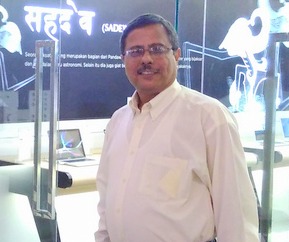
Arijit Chaudhuri, located in Navi Mumbai, petroleum geologist by profession. Also interested in issues concerning pollution, climate change and fast depleting groundwater reserves.Travelling, reading, writing articles, composing rhymes and recitation are his hobbies.

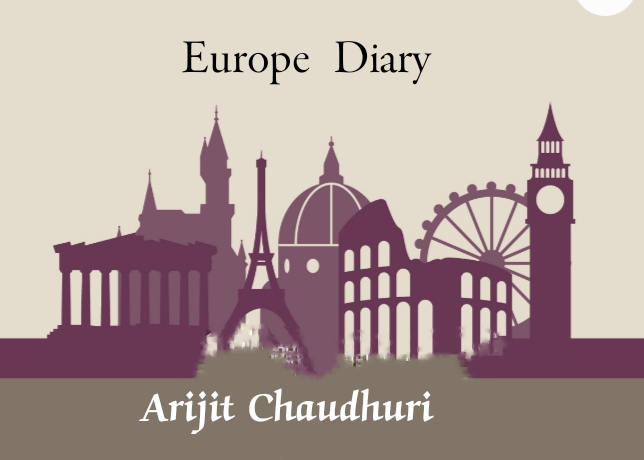
Memorable experience indeed. Preserving our past with care and respect without the urge to unduly glorify or denigrate them is a lesson we need to learn from western Europeans.
Every private encounter between individual Indians and Pakistanis end the way the author described, irrespective of whether that person is pro-establishment or not. Here obviously, the Pakistani was not much pro-Pakistani.
However, in a group they feel the need to loudly exhibit their Islamic credentials, almost like a programmed response. This used to confuse me at first. Could it be due to the deep religious training and the ecosystem in which they grow up right from birth?
Many thanks for your thoughtful comments.
Oppressive regimes engage informers through payment or by means of ideological inducement. People under such regimes feel insecure about speaking their mind (dissent) in a group due to the fear of being reported against. S/he does not know who might be the informer near him. individual dialogue with a foreigner is different. In Glasgow a Pakistani taxi driver spoke about his dissent while alone. I feel, he is very likely to speak differently in a gathering of Pakistanis.
Somebody said, ‘A man would lie. Give him a mask (of anonymity), he will speak the truth.’
Excellent journal Arijit da. ???.
Your interaction with the amiable couple in unexpected location is very interesting and we’ll presented. Mob mentality either by choice or by fear is quite evident. Thanks for sharing Dada.
Dear Arijit,
Great narration of your visit to Germany. While going through your travelogue, I felt as if I am travelling with you. Your experience with Abro and family, reaffirms the belief that humanity is not limited by geographical boundaries and identities. Wish that the same belief prevailed amongst the people holding powerful positions.